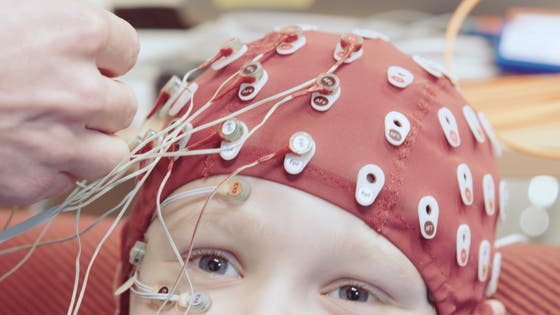Epilepsy
Epilepsy
Through internationally recognized and societally well-embedded translational research, our center adds to the improvement of the health of patients – particularly children – with refractory, complex, and rare epilepsies. We aim to translate both basic science and patient-driven research questions into clinically applicable diagnostic methods, prediction tools, and novel treatment options.

The UMC Utrecht is a nationally (NFU) endorsed center of expertise for refractory childhood epilepsy and pediatric epilepsy surgery. We are member of the European Reference Network (ERN) for rare and complex epilepsies “EpiCARE”.
Background information uitklapper, klik om te openen
Disease focus of the program
- focal structural epilepsy (in particular focal cortical dysplasia)
- monogenic epilepsy syndromes.
Methodological areas of expertise
- multicenter data collection
- outcome prediction modeling
- advanced EEG analysis, in particular networks and HFOs
- epilepsy surgery & presurgical diagnostics
- (epi)genetics.
Clinical goals
- improvement of patient counselling and outcome prediction
- presurgical decision making and patient selection
- optimizing AED policies and personalized treatment
- developing novel therapies.
Epilepsy is one of the most prevalent chronic and severe neurological disorders. Up to one third of people with epilepsy do not become seizure-free with antiepileptic (or rather; anti-seizure) drugs. Comorbidities – in particular developmental delay and cognitive dysfunction – are frequent in people with epilepsy and have high impact on their quality of life and long-term outcome. The broad spectrum of underlying etiologies is increasingly acknowledged. Recent developments in understanding of pathophysiological mechanisms associated with epilepsy have opened the door to targeted and personalized treatment options. These range from molecular treatment targets – based on the identification of genetic etiology – to epilepsy surgery in people with focal seizures and well-circumscribed structural lesions outside eloquent brain areas.
As a nationally and internationally endorsed center of expertise for rare and complex epilepsies, our strength lies in the multidisciplinary collaboration between basic scientists and clinical epileptologists. We have a clinical focus on refractory epilepsy in the context of epilepsy surgery (for which the UMC Utrecht serves as the largest and oldest Dutch center, with national exclusivity for children) and on rare genetic pediatric epilepsies (with a longstanding and national expertise in the field of epilepsy genetics).
Epilepsy and the research approaches uitklapper, klik om te openen
Environmental risks
- Relation between stress and seizures in epilepsy
- Consequences of seizures and of antiepileptic drugs on brain development and cognition
From research to care
- Safety and risks of antiepileptic drug withdrawal
- Individualized prediction modelling of seizure relapse risk after antiepileptic drug withdrawal
- Prediction of seizure and cognitive outcome after epilepsy surgery
- Prediction of epilepsy (occurrence and severity) and of cognitive outcome in tuberous sclerosis complex, based on MRI biomarkers
- Diagnostic accuracy and added value of presurgical tests
- The use of HFOs as biomarker for epilepsy diagnosis, prognosis, epileptogenic zone localization, and for surgical tailoring
- Optimal treatment of ESES syndrome, i.e. European Recue ESES randomized controlled trial (clobazam versus steroids)
- Development of wearable seizure detection device (Nightwatch®)
- Development of alternative EEG analysis approaches for epilepsy diagnosis
- Diagnosis and treatment of neonatal seizures; drug trials
Genetic risks
- Clinical characterization of monogenic and complex genetic epilepsy syndromes
- GWAS studies to identify epilepsy risk loci and compute cumulative risk scores
- Identification of susceptibility genes for febrile seizures and temporal lobe epilepsy (TLE)
- Elucidation of the molecular and cellular mechanisms underlying epileptogenesis to identify biomarkers and new drug targets
- Pharmacogenetics of refractory epilepsy
- Influence of genetics in presurgical decision making and surgical outcome
- Teratogenic effects of anti-epileptic drug use in mothers
Structure and connections
- In vivo DTI of microstructural white and gray matter pathology
- EEG and resting-state fMRI studies of functional connectivity
- Graph analysis of complex network properties
- Functional and structural hippocampal involvement in focal epilepsy
- GRID and ECoG analysis of EEG signals, high-frequency oscillations
- fMRI studies of brain function
- High-field structural MRI of epileptogenic lesions
- Functional imaging of epileptic foci (PET, SPECT, MEG, EEG-fMRI)
Translational research
- Induced pluripotent stem cell models of brain structure and connectivity
- Zebrafish / cell / brain organoid models to test treatment targets and genetic modification in monogenic epilepsies
- Role of post-translational mechanisms (e.g. non-coding RNAs) in epilepsy, as biomarkers and treatment targets

